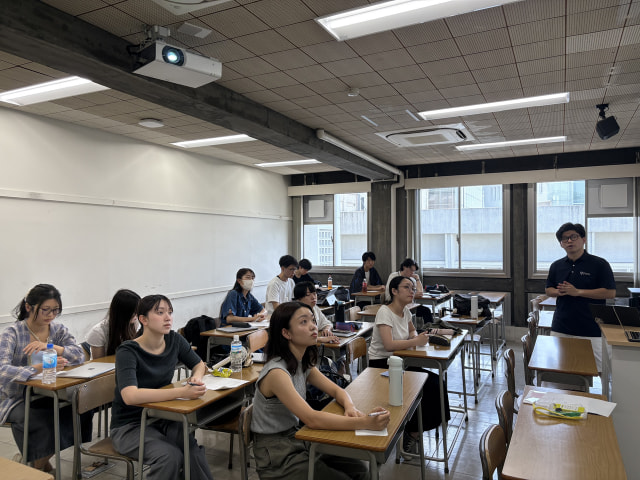比較教育/Comparative Education 2025
- 日本以外の国で、義務教育の一時期を過ごしたことのあるメンバーと日本のみで義務教育を受けたメンバーが半々という面白いグループでした。お互いの経験を共有、議論し、多くの学びがあったことと思います。

メンバー / Member
- 橋本 侑果 / HASHIMOTO YUKA
- 石山 真紀 / ISHIYAMA MAKI
- 鈴木 絵理奈 / SUZUKI ERINA
- 今井 研介アゴラ / IMAI KENSUKE AGOLA
- 渡辺 きらり / WATANABE KIRARI
- 小泉 葵 / KOIZUMI AOI
- 有馬 右京トーマス / ARIMA UKYOTHOMAS
- 冨田 悠 / TOMITA YU
- 高祖 龍一郎 / KOSO RYUICHIRO
- 鈴木 尋斗 / SUZUKI HIROTO
- 松尾 圭吾 / MATSUO KEIGO
- 増田 雄紀 / MASUDA YUKI
- 藤岡 珠希 / FUJIOKA TAMAKI
- 市田 彩乃 / ICHIDA AYANO
プロジェクト / Research Projects
- Primary Education in China and Japan: Systems and Social Expectations
-
The Impact of Early Childhood Education on National Character
-
A Comparison of Language Education Support for Foreign Students in Elementary and Junior High Schools in Japan and the United States of America
-
Divergent Paths: A Comparative Analysis of Elementary Education, Student Perspectives, and Opportunity in Japan, Thailand, and Cambodia
-
The History & Cultural Backgrounds of Girls’ Schools in Japan, China and France
-
Comparative Study on Patriotic Education in Six Countries: Focus on Elementary School Education
-
Elementary School Breaks: A Comparison of Japan, the U.S., China, and France
-
A Cultural and Pedagogical Comparison of Early Childhood Education in Japan and China
-
A Comparison of School Cleaning Culture in Japan and the United States —From Cultural Background to International Applications—
-
University Entrance Exam in Japan, Korea, Chaina, and US
-
Comparison of Physical Education in Elementary School in Japan, China and United States
-
Early Childhood Education in Japan and Finland
-
School Meals and Food Education Around the World ~Through Comparing Three Countries’ History and Problems~
-
Educational Disparities in Indonesia and Japan
メンバーの声 / Member’s Voice
Although it was only a short spring semester, I learned a lot from participating in the class. I have come across numerous articles attributing Japan's recent economic stagnation to its education system. As a result, I had unconsciously assumed that Japan's education system lagged behind those of other developed nations. However, through this course, I learned the importance of properly comparing data, the necessity of quantitatively analyzing information, and the precautions required when interpreting data. This process helped me realize that my previous impressions of Japan were heavily influenced by biases.
I fully enjoyed how classes proceed and what we discussed in group. I deeply believe that being based on specific data or fact is quite important to discuss the subject, especially in this era. So it was a nice opportunity to remove bias from our mind and communicate with other students. I’m looking forward to see you all again in the next semester!
I really enjoyed it. I took this class because I was interested in comparing Japanese education with that of other countries, and I wanted to have opportunities to speak and think in English. Through classroom videos and discussions, I saw differences in how Japan, the U.S., and China educate children. Each country has its own values. By comparing their systems, I was able to understand Japan’s strengths and weaknesses more deeply. I also found everyone’s final projects very interesting and unique. By comparing different aspects, I could see not only the differences but also the similarities. It helped me think from multiple perspectives, not just one. I learned that we shouldn’t be trapped by a single point of view.
I thoroughly enjoyed this course. Learning about education through a comparative method was a new experience for me, and it definitely helped change my perspective, especially on Japanese education. Through this class, I realized that I held a negative bias toward the Japanese system. Now, however, I understand the importance of objective comparison in order to identify a system's true strengths and weaknesses. I also found the class structure to be very effective, as it created an environment that encouraged us to express our own opinions and be creative.
I have been enrolled in this class since the fall semester, and I re-enrolled for the spring since I really liked it. I never thought I would be drawn to comparative education because I have a background in business and economics, but your lesson really altered my viewpoint. I learned how regional traditions and international influences interact in schools by investigating policy borrowing, conflict theory, and structural-functionalism. I now realize that while "best practices" might inspire creativity, they must be tailored to the circumstances and culture of each community; for instance, Finland's approach isn't a ready-made answer for Japan. Your observations made me consider who actually gains from educational programs and served as a reminder that schools both influence and reflect society. I’m grateful for this journey and excited to see how I can apply these lessons in the future.